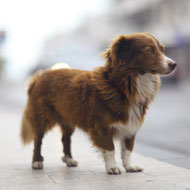Ten stray dogs a day found with out-of-date microchips

Getting dogs microchipped and keeping contact details up to date has been a legal requirement since April 2016.
A new study has found 10 stray dogs a day are not reunited with their owners and face the threat of being put to sleep, because their microchip contains out of date information.
Microchip database, the National Veterinary Data Service (NVD), is urging pet owners to make sure their microchip is updated every time they change their contact details.
The Stray Dog Survey, carried out by the Dogs Trust, suggests that 181 dogs go missing every day. This is the lowest number of stray dogs since 1997, however the charity’s campaigns officer, Lee Paris, said the finding is “a double-edged sword”.
Figures also show that 69 per cent of microchipped stray dogs taken in by local authorities could not be reunited with their owners due to incorrect contact details on the microchip. Dogs Trust suspects many of these dogs may be much loved family pets that tragically ended up permanently separated from their families because their owner had moved house or changed their phone number, but neglected to inform the microchip database.
Getting dogs microchipped and keeping contact details up to date has been a legal requirement since April 2016.
Mr Paris added: “Whilst showing the greatest reduction in stray numbers since records began, the findings also demonstrate that owners are failing to follow the law when it comes to ensuring the details on the microchip are up-to-date and that they wear a collar and tag.”
NVD was launched with the aim of tackling out-of-date contact information on microchips. The data service works with veterinary practices to ensure that if clients move home or change their phone number, they need only tell their veterinary practice and the details held on NVD’s microchip database will automatically update.
A spokesperson from NVD said: “The figures published by the Dogs Trust are deeply concerning. It’s tragic to think that so many pets cannot be reunited with their owners as a result of out-of-date contact information.
“The NVD was set up specifically to overcome this issue. All microchip information is processed and kept up-to-date through a pet owner’s local veterinary practice. Through working directly with veterinary practices, the need for pet owners to go online and remember to update their information is overcome.
“NVD-registered practices are able to reassure their clients that should their pets be lost, the most up to date contact information will be available.”



 The latest
The latest